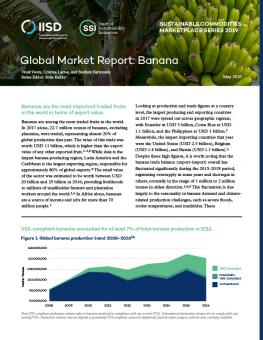
Global Market Report: Bananas
This report examines how voluntary sustainability standards are used to promote sustainable development in the banana sector.
Key Messages
- North America and Europe are driving demand for sustainably produced bananas, which have captured a 10% share of some markets.
- From 2008 to 2016, voluntary sustainability standard-compliant bananas grew to account for at least 7% of the sector (36% of exports).
- Asia is the largest producing region, but 80% of exported bananas come from Latin America and the Caribbean.
Bananas (including plantains) are the world’s fourth most important staple crop (after wheat, maize, and rice). The sector faces a variety of sustainability issues, including crop disease, climate change impacts, excessive pesticide use, and poor labour practices. Banana producers are increasingly using voluntary sustainability standards (VSSs) to tackle the sector’s sustainability challenges.
This report is the sixth in IISD’s Sustainable Commodities Marketplace Series, which presents market information and analysis on agricultural commodities to foster transparency, knowledge, and strategic decision making for sustainable development.
Additional downloads
You might also be interested in
Promoting the Development of Agricultural Cooperatives
Governments in the Global South should promote agricultural cooperatives to boost smallholder access to fair markets, finance, and climate resilience.
Fitting the Pieces of the Puzzle
Governments are adopting sustainability standards for global value chains (GVCs), but businesses in the Global South face challenges in meeting these evolving regulations.
Women Turning the Table on Food Loss and Waste in Kenya
A group of changemakers led a movement to tackle food loss and waste in Kenya. IISD experts have been working closely with local women leaders to make change happen.
Will the Inclusion of Voluntary Standards in Trade Agreements Lead to More Sustainable Trade?
The use of voluntary sustainability standards (VSSs) and similar systems in free trade agreements (FTAs) is gaining traction. Will it lead to more sustainable production and consumption globally?